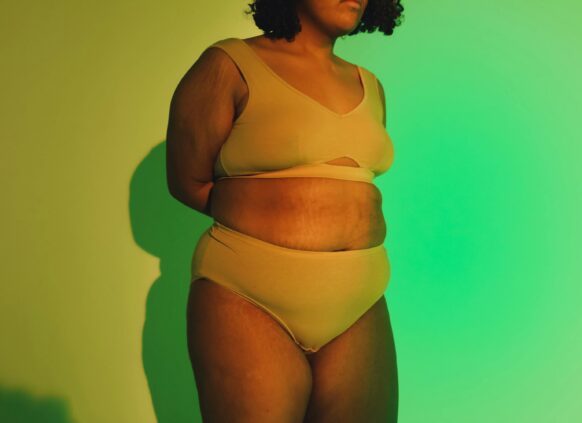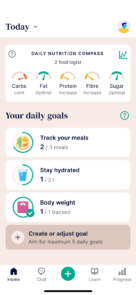
Hypnotherapy for weight loss: does it actually work?
Hypnotherapy uses relaxation to help shift habits or thoughts around food and activity. Some people find it helpful for weight loss, but it’s not a quick fix — and evidence is limited.
Sustainable weight loss still comes from lifestyle changes, like eating well and moving more. If you’ve already tried this and have a BMI over 35, you may be eligible for Oviva’s NHS-funded weight loss programme, with personalised, expert support and, if eligible, access to weight loss injections.
Key Takeaways
- Hypnotherapy for weight loss uses guided therapy to help shift thoughts, behaviours and habits related to weight.
- Some evidence shows benefits—but results vary from person to person. It’s not andalone solution and there are no guarantees it’ll work.
- You can try professional sessions, self-hypnosis or audio tracks, including while you sleep.
- Hypnotherapy is not a substitute for evidence-based weight loss treatments like a balanced diet, regular activity or prescription weight loss medication.
What is hypnotherapy?
Hypnotherapy is a type of treatment that guides you into a state of deep relaxation and focused attention — also called hypnosis. In this state, you may become more open to suggestions about changing certain habits or thought patterns.
Some people find it helpful for changing eating behaviours or emotional responses.
Hypnotherapy can be:
- Led by a trained professional
- Self-guided using visualisation or written scripts
- Done through audio recordings, including while you sleep

Can hypnotherapy help with weight loss?
Hypnotherapy for weight loss aims to influence some of your subconscious thoughts and beliefs and challenge your established behaviours around weight management.
Through guided hypnotherapy, it may be possible to address underlying causes of emotional eating or unhealthy eating patterns to help you change your behaviours and lose weight.
One study found clinical hypnotherapy may enhance the effects of cognitive behavioural therapy (CBT). 66% of people receiving both saw better weight loss results than those who had CBT alone.
But it’s not a guaranteed fix. Hypnotherapy doesn’t work for everyone, and it’s not a replacement for proven weight loss strategies like healthy eating, regular movement or approved medication.
The NHS explains that you can’t be hypnotised if you don’t want to be. And some benefits may simply be due to the placebo effect.
Types of hypnotherapy for weight loss
Hypnotherapy for weight loss isn’t one-size-fits-all. You might try:
1. Professional hypnotherapy
Professional hypnotherapy is carried out by a qualified hypnotherapist. It’s important to find a hypnotherapist with a healthcare background who is registered with an organisation accredited by the Professional Standards Authority.
At the start of treatment, you’ll usually meet with your hypnotherapist to talk about your goals. These might include building healthier habits or managing emotional eating.
During sessions, the hypnotherapist will guide you into a relaxed state using techniques like visual imagery, gentle repetition and a calming tone. This focused, restful state is known as hypnosis.
One approach sometimes used for weight loss is a ‘virtual gastric band’. This involves using guided imagery to simulate the feeling of having gastric band surgery.
Some people report a reduced appetite after these sessions — but it’s worth noting that a pilot study found no significant difference in weight loss between this and standard hypnotherapy combined with a self-guided diet.

2. Sleep hypnotherapy for weight loss
Sleep hypnotherapy involves listening to audio tracks or audiobooks while you rest. These are designed to promote positive behaviours around eating and activity by gently guiding your subconscious thoughts and reprogramming thought patterns.
The idea is that, in a relaxed state, you may be more open to suggestions — such as reminders that you’re in control of your choices.
Some people find this helpful, but the scientific evidence is limited. There’s no strong research to suggest sleep hypnotherapy is more effective than other weight loss approaches.
3. Self-hypnotherapy for weight loss
Self-hypnotherapy involves using relaxation techniques, like visualisation, to guide yourself into a focused, calm state. From there, you repeat positive suggestions linked to your weight loss goals and the habits you’d like to change.
You might follow a written script or listen to an audio track designed to help shift your mindset — similar to sleep hypnotherapy.
While some people find this useful, a small study found no significant difference in weight loss between those using audio self-hypnosis and those listening to a placebo recording.
Risks and considerations
Lack of regulation
In the UK, hypnotherapists aren’t legally required to have qualifications. That means hypnotherapy can be offered by people without formal training or a healthcare background.
It doesn’t work for everyone
While some people benefit from hypnotherapy, it’s not a guaranteed method. Hypnotherapy doesn’t work for everyone. Its effectiveness depends on how suggestible you are.
Potential side effects
Some people experience adverse emotional reactions or even false memories after hypnotherapy. The NHS also warns that hypnotherapy may worsen certain mental health conditions, including psychosis or some personality disorders.
Limited scientific evidence
While some studies show a link between hypnotherapy and weight loss, evidence is limited.
If you do try it, use it alongside proven weight loss treatments like healthy eating, regular activity, and expert support.

Is weight loss hypnotherapy available on the NHS?
Hypnotherapy is not usually available on the NHS. There may be some exceptions to this, but you’ll usually have to fund hypnotherapy yourself or try methods like self-hypnotherapy.
If you think you’d benefit from professional hypnotherapy, you could ask your GP or write to your local integrated care board to see if they’d be willing to make an exception. In most cases, however, you’ll need to pay for professional hypnotherapy privately.
Science-backed weight loss strategies
Hypnotherapy might help some people with motivation, but lasting weight loss comes from evidence-based changes like:
- Eating balanced meals rich in lean protein, fibre and healthy fats to keep you fuller for longer.
- Limiting processed and ultra-processed foods like cakes, sweets, and ready meals.
- Exercising regularly — brisk walks and housework count. Aim for 150 minutes a week, but it’s okay to build up at your own pace.
- Tracking your food and activity using a journal or app to spot habits–this way you can see not just what you’re eating, but how you’re eating.
- Getting enough sleep can help with energy and cravings. It’s not always easy, so try small wind-down habits—like limiting screens or keeping a routine when you can.
Using approved weight loss medication, like Wegovy, if you’re eligible.

Sustainable weight loss. Personalised support. NHS-funded.
Tried to lose weight before and nothing’s stuck? You’re not alone — and you don’t have to do it by yourself.
If your BMI is over 35, you may be eligible for Oviva, an NHS-funded programme designed to help you lose weight safely, without calorie counting.
With Oviva, you get:
- One-to-one support from dietitians, psychologists and doctors.
- A plan that fits your life — flexible, remote, and tailored to you.
- Access to approved weight loss medication, if eligible.
- Tools to track your meals, movement and progress in the Oviva app.
97% of Oviva users would recommend us. Find out why.








